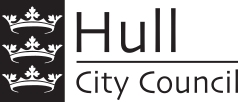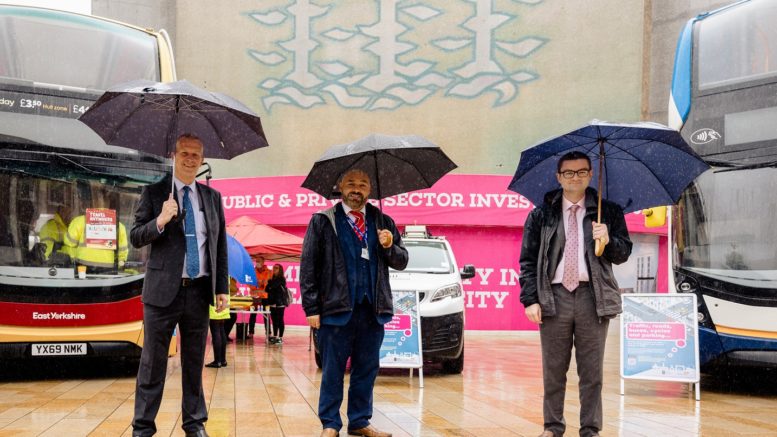Buses in Hull have revealed a significant improvement in service since the introduction of extended bus lane times.
Local bus operator Stagecoach East Midlands say that journey times have become nine per cent quicker since the measures were introduced, and East Yorkshire have recorded a four per cent improvement on certain routes.
In addition, a transport survey carried out over the summer discovered that 27 per cent of respondents would consider using buses as an alternative form of transport to cars if the buses were more reliable.
The data comes as Hull City Council took the decision to retain the current infrastructure as part of plans to improve sustainable transport in Hull.
Councillor Dean Kirk, portfolio holder for highways and transport said: “Prior to all-day bus lanes, anecdotal evidence showed that the majority of motorists tended to avoid using the bus lanes during the day, even though permitted to do so.
“As a result, the extended hours of 7am-6.30pm were installed to improve bus efficiency, and following public feedback this was one of the main concerns when it came to public transport.
“By introducing these measures we’re working towards developing a transport network that works for everyone.”
For Stagecoach, bus journey times during the pandemic in 2020/21 were around 16 per cent shorter as a result of the expansion of the bus lane operational times and the lighter traffic levels.
The average journey time from starting point to end destination for each bus was around 40 minutes compared to 48 minutes, pre-Covid. Bus operating speeds during 2020/21 were around 19 per cent quicker at 11.8 mph compared to pre-Covid at 9.9 mph.
Matt Cranwell, Managing Director at Stagecoach East Midlands, said: “As a direct result of the increase in the bus lane hours, we have been able to shorten the passenger journey times on many of our bus services simply because buses are able to cut through traffic more easily.
“The increase in the hours of bus lane operation has improved bus passenger journeys times by over 9 per cent, giving buses priority over other traffic makes a clear statement that sustainable travel is the right choice for short journeys into the city centre. These measures make buses a more attractive option and there is evidence to suggest that Hull’s bus patronage levels are rebuilding faster than other areas as a consequence.”
Ben Gilligan, area director of East Yorkshire Buses, said: “The extended hours of operation of the bus lanes have, on balance, provided a material benefit to the bus services we operate in Hull. As well as providing a reduced level of variability in journey times between days, it has also meant that our services have been more reliable than they would have been given the car led recovery as we have exited the lockdowns.
“It sends a clear signal that public transport is a priority and we fully support the programme.”
An average single decker bus can carry 60 passengers which means that at a current occupancy rate for private vehicles of 1.3 passengers, a single full bus could remove 46 vehicles from the network.
Councillor Dean Kirk, said: “Whilst ongoing improvements are made to the bus fleet in Hull, consideration must be given to the number of people a single bus can move as opposed to a private vehicle.
“We want people who live in, visit and travel around the city to choose a more sustainable form of travel, and providing a reliable and efficient bus service is critical to achieving this.
“By helping people travel greener, minimising pollution and tackling congestion, we are putting Hull on the road to becoming a carbon-neutral city by 2030.”
The Council is also working closing with local bus companies Stagecoach and East Yorkshire on developing a Bus Service Improvement Plan (BSIP) as part of a programme to improve bus services across the city.
The key objectives of the BSIP 2021/22, which covers the period 2022 to 2035, include:
- A review of all key roads to ensure buses are prioritised and have free flow, improving frequency, journey times and cost value.
- A review of the service provision to key industrial, health and entertainment/leisure areas, with the aim of providing new or improved services to locations that are currently hard to reach on public transport, including for shift and night-time workers.
- A review of the bus network with the aim of simplifying routes and increasing commercially viable bus frequencies on key routes to foster a “just turn up” approach.
- Working towards implementing a carbon-neutral fleet by 2035.
- Continuously seeking to encourage flexible and simpler prices.
- Ensuring passengers have a seamless experience when planning journeys and travelling, especially by bus and rail via Hull Paragon Interchange.
- A review of the parking strategy and links with park-and-rides.
- Establishing a performance framework that links to sustainable city outcomes.
- Exploring the feasibility of a bus rapid transit system on an identified route between the city centre and Kingswood. Rapid transit is a dedicated route for guided buses or buses that runs in a similar way to a tram. It has full and exclusive priority on the route and looks and feels like a tram service, often with double-length buses.




